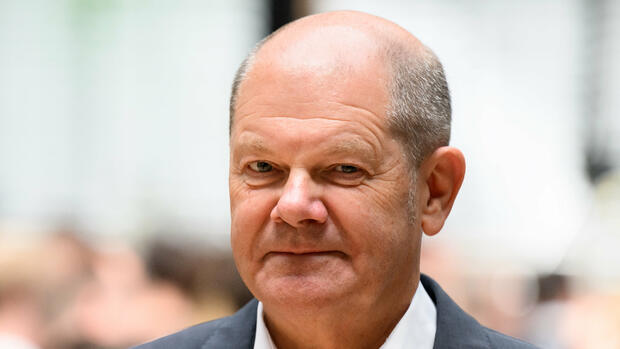The Chancellor is now negotiating with the traffic light groups on the draft law on the GEG.
(Photo: dpa)
Berlin The controversial law for replacing old oil and gas heating systems continues to cause disputes in the traffic light coalition. For the time being, the parliamentary secretaries did not put the law on the agenda of this week’s Bundestag session. This will make it more difficult to get the law through the Bundestag before the summer break, as previously planned.
Chancellor Olaf Scholz (SPD), Economics Minister Robert Habeck (Greens) and Finance Minister Christian Lindner (FDP) are now also involved in the deadlocked negotiations. On Tuesday afternoon they will discuss with the parliamentary groups how it might be possible to get the law into the Bundestag after all.
The group sits together in the southeast tower room of the Reichstag, the room of the SPD parliamentary group executive committee. Chancellery Minister Wolfgang Schmidt (SPD) as well as the parliamentary group leaders and the deputies responsible for the topic are also present. It is still unclear whether the group can still reach an agreement today. “Let’s see,” said participants.
The parliamentary group leader of the Greens, Katharina Dröge, was still confident at noon. She said the bill to reform the Building Energy Act (GEG) could be discussed in the Bundestag this week. Every day until 6 p.m., the law can be placed on the agenda for the next day by means of a procedural motion. “That’s what we’re striving for as the Greens and that’s what we should aim for as a traffic light,” said Dröge. Accordingly, Thursday of this week would be the last day for an agreement. The law could then be introduced into the Bundestag on Friday, all the usual deadlines of the legislative process would be observed. An accelerated procedure would also be possible at a later point in time.
Dröge added that the traffic light had agreed in the coalition committee to pass the law before the summer break. If it didn’t happen, which she doesn’t expect, it would put a strain on the coalition’s ability to act. However, she said she was “confident that we will come to a result”.
With the heating law, the federal government wants to ensure more climate protection when heating. From 2024, every newly installed heating system should be operated with at least 65 percent renewable energy.
The traffic light coalition has been arguing about the energy turnaround in the boiler room for weeks. In April, the federal cabinet approved the draft law by Economics Minister Robert Habeck (Greens) and Federal Building Minister Klara Geywitz (SPD). The heads of the SPD, Greens and FDP had previously agreed that the amendment to the GEG should be passed in the Bundestag by the parliamentary summer break.
Nevertheless, the FDP called for a complete revision of the plans for the gradual replacement of the heating system and thwarted the date for the first reading in parliament in May. This would have been the start for the work of the parliamentarians in the Bundestag committees, who could adjust the plans in several points. Economics Minister Habeck then accused the Liberals of “breach of word”.
The parliamentary group leader of the Greens expects that the GEG will be passed before the summer break.
(Photo: dpa)
On Tuesday morning, Habeck appealed to his coalition partners to pass the heating law before the parliamentary summer recess. The GEG has occupied Germany long enough, said the Greens politician. “A lot of debates have been held. It doesn’t get better if you leave it.” It’s now about more than the heating law. “The government should already be demonstrating its ability to govern.”
Habeck: “Many corridors of agreement”
There are many corridors of agreement, said Habeck. “We have taken many more steps to expand the possibilities. If you want, you can come together. But you have to want it now.” And if you don’t want to, then it’s not because you can’t reach an agreement, but because “obviously” you don’t have the last bit of energy to reach an agreement.
The liberals are convinced that the original version of the draft law was too rigid. The FDP wants openness to technology, longer transition periods and less coercion. FDP General Secretary Bijan Djir-Sarai said Tuesday morning that the previous changes to the draft did not go far enough. The law still has enormous deficits, it is inefficient for the climate and unsettles people.
A greener heat supply is necessary because the building sector has so far caused high climate-damaging CO2 emissions. According to the Ministry of Economic Affairs, almost half of the approximately 41 million households in Germany heat with natural gas, followed by heating oil with almost 25 percent and district heating with a good 14 percent.
Direct electricity heating and heat pumps therefore each account for less than three percent. This means that more than 80 percent of the heat requirement is currently covered by burning fossil fuels.
More: GEG – What costs the CO2 price would mean for private households
